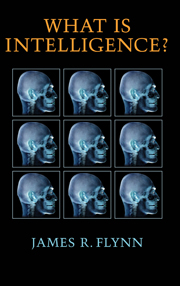Book contents
- Frontmatter
- Contents
- List of figures
- List of tables
- List of boxes
- Preface to the expanded paperback edition
- Acknowledgments
- 1 A bombshell in a letter box
- 2 Beyond the Flynn effect
- 3 Towards a new theory of intelligence
- 4 Testing the Dickens/Flynn model
- 5 Why did it take so long?
- 6 IQ gains can kill
- 7 What if the gains are over?
- 8 Knowing our ancestors
- 9 The art of writing cognitive history
- 10 About GUT: the grand unification theory of intelligence
- 11 Howard Gardner and the use of words
- Appendix I Tables
- Appendix II Declaration in a capital case
- References
- Subject index
- Name index
6 - IQ gains can kill
Published online by Cambridge University Press: 05 August 2012
- Frontmatter
- Contents
- List of figures
- List of tables
- List of boxes
- Preface to the expanded paperback edition
- Acknowledgments
- 1 A bombshell in a letter box
- 2 Beyond the Flynn effect
- 3 Towards a new theory of intelligence
- 4 Testing the Dickens/Flynn model
- 5 Why did it take so long?
- 6 IQ gains can kill
- 7 What if the gains are over?
- 8 Knowing our ancestors
- 9 The art of writing cognitive history
- 10 About GUT: the grand unification theory of intelligence
- 11 Howard Gardner and the use of words
- Appendix I Tables
- Appendix II Declaration in a capital case
- References
- Subject index
- Name index
Summary
These death sentences are cruel and unusual in the same way that being struck by lightning is cruel and unusual … (T)he Eighth and Fourteenth Amendments cannot tolerate the infliction of a sentence of death under legal systems that permit this unique penalty to be so wantonly and so freakishly imposed.
(Justice Stewart in Furman v. Georgia, 1972)Some people are peculiar in the sense that they are less interested in the advancement of knowledge than in practical matters. Massive IQ gains over time have practical relevance because they expose mistakes in measuring IQ. These mistakes are costly because they deceive us about causes and even deceive us into putting people to death who ought to be exempt. The root cause of all of these unfortunate consequences is scoring against “obsolete norms.”
Obsolete norms
An IQ score is only as valid as the test the person takes, and the test is only as valid as the standardization sample on which it is normed. When someone is assigned an IQ of 100 that means that their performance on a particular test was exactly average or at the 50th percentile. And the score is accurate only if the person is being compared to a representative sample of his or her peers, for example, a representative sample of American 14-year-olds tested at exactly the same time. The reason the test must have been normed recently is the existence of massive IQ gains over time.
Information
- Type
- Chapter
- Information
- What Is Intelligence?Beyond the Flynn Effect, pp. 111 - 142Publisher: Cambridge University PressPrint publication year: 2007
